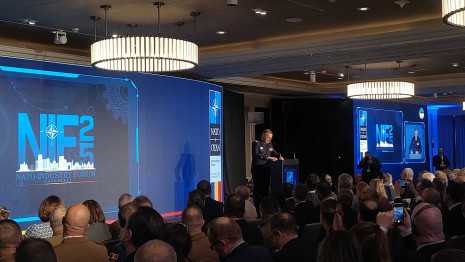“Everybody can think independently, but we must be able to work in harmony”
NATO Industry Forum in Bucharest
Text: Ádám Draveczki-Ury | Photo: HDF Defence Staff, Romanian armed forces | 16:18 November 10, 2025Interoperability, honesty, risk-taking – this was how Deputy Chief of Defence (Territorial Defence) Lieutenant General Zoltán Mihócza summed up the most important keywords of the NATO Industry Forum 2025 that took place last week. The general emphasized that speeding up acquisitions is currently one of the most important goals of the Alliance.
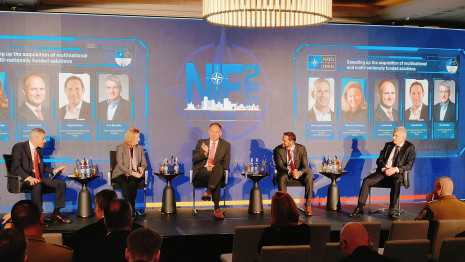
On 6-7 November, Bucharest hosted NATO’s conference on defence industry cooperation, the two-day NATO Industry Forum (NIF). Held on a regular biannual basis, the NIF is organized by NATO’s Allied Command Transformation (Norfolk) in cooperation with the Brussels-based NATO Headquarters. At the 2025 event, more than 800 participants represented NATO’s member states and organizations dealing with capability development, acquisition and logistic support. Besides, representatives of close to 300 different defence industry companies attended the forum. During presentations and panel discussions, the heads of NATO organizations also had the opportunity to exchange views with the representatives of industrial players.
Not a choice, but a necessity
Rearming NATO – Innovate, Accelerate, Sustain was the theme of the 2025 edition of the NIF. NATO Secretary General Mark Rutte also attended the conference, emphasizing in his keynote address that the North Atlantic Alliance must strengthen its defence industry so it can meet the threats and sustain peace through strength. The three key drivers to be taken into consideration in achieving this objective are quantity, creativity and cooperation. This means that we must expand existing production lines, open new ones, and shorten delivery times. “Until recently, Russia was producing more ammunition than all NATO Allies put together. But not anymore” – he said. The Secretary General also talked about the need for low-cost air defence assets and drone interceptors, emphasizing that “here, quantity is key”. Mark Rutte called creativity and innovation further key drivers, which must be promoted in the future.
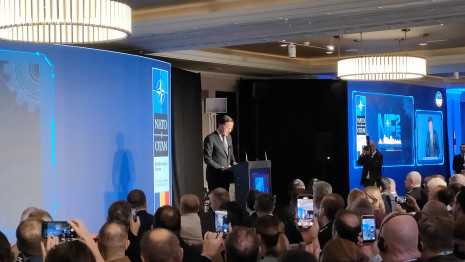
In his keynote speech at the forum, President of Romania Nicusor Dan pointed out that all the threats and challenges the NATO member countries are confronted with today bring us to mind that peace and security are never guaranteed, and “[T]his is why rearmament is not a choice, but a necessity”.
Honesty and risk-taking
“The forum is focused on NATO’s capability development so that the Alliance can engage in combat with the presumed enemy” – said Lieutenant General Zoltán Mihócza in answer to a question from defence.hu. The general, who attended the conference representing Hungary and the Hungarian Defence Forces said that “As the NATO Secretary General said, the goals are to rearm and to speed up acquisition by analyzing the lessons learned about the currently ongoing Russo-Ukrainian War. Thus, the member states can find innovation solutions as soon as possible by manufacturing equipment on the industrial level with which they can respond to new challenges. Of course, this enables them to deliver these assets to the users – that is, to the soldiers – in the shortest possible time.
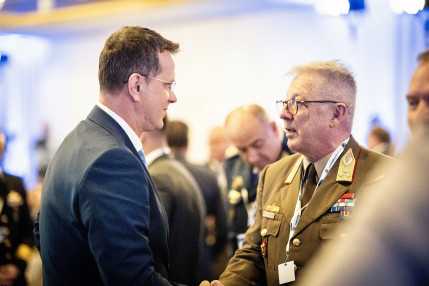
The Deputy Chief of Defence (Territorial Defence) underlined that the conference was taking place all along in the most honest atmosphere possible. “The representatives of industrial conglomerates also emphasized the importance of honesty. If the thirty-two member countries know the rules and methodology of each other’s acquisition process, then they can cooperate much more quickly and effectively. Developing in a modular system is also of key importance. If different countries find answers to a problem in their own modules, all the Alliance requires is that these modules be interoperable. This is a great idea because this way the nations and their defence industries don’t have their hands tied. That is, everybody can think independently, but we must be able to work together in harmony”.
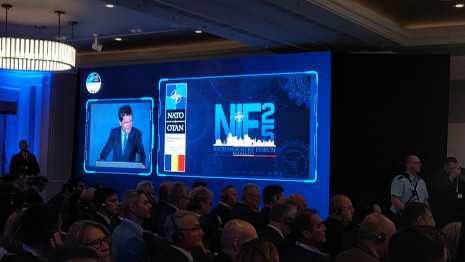
Besides, the NATO Secretary General also emphasized the importance of risk-taking, and mentioned another new aspect. As Lieutenant General Zoltán Mihócza summed up, “there isn’t equipment and resources available to everything, not everything can be solved immediately. You can prepare for the management of a conflict only as a result of a long process. As a rule, political and military leaders take risk when, for example, they decide to purchase asset A and deprioritize asset B a little in a situation where both assets are missing from the equipment pool. The Alliance will buy what the industrial players produce, since defence budgets continue to increase as a share of GDP, first to 3.5 percent and then to 5 percent. So, the necessary financial resources will be guaranteed to be available for political leaders, and this is what we say to the manufacturers: produce and give us products, and later on the profit will be realized in your hands. That is, NATO expects this kind of risk-taking of defence industry players as well. In this form, this is an entirely new idea.”
